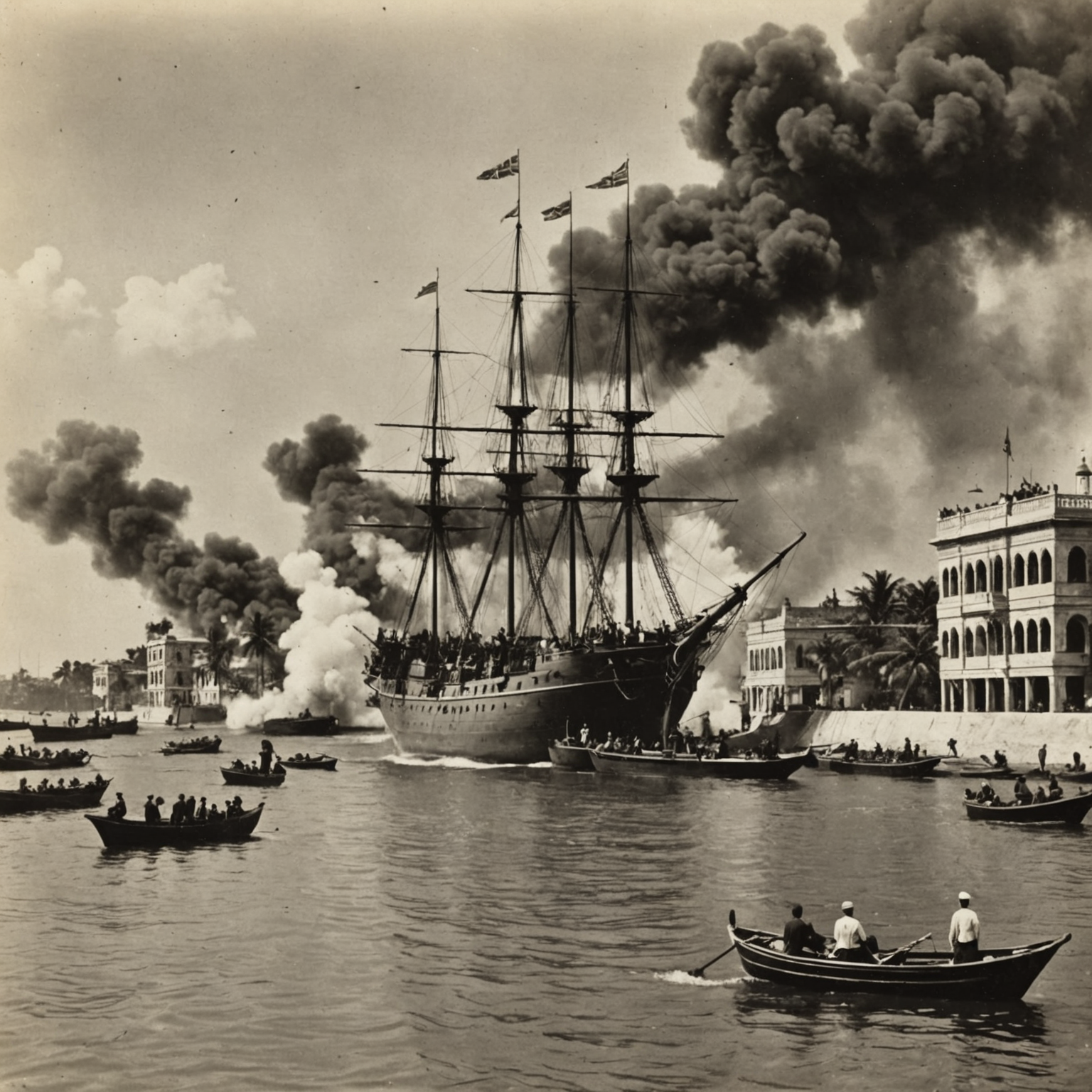The World’s Shortest War: How a 38-Minute Conflict Changed History
 British warships bombarded the Sultan’s palace in Zanzibar, ending the shortest war in history in just 38 minutes on August 27, 1896.
British warships bombarded the Sultan’s palace in Zanzibar, ending the shortest war in history in just 38 minutes on August 27, 1896.
When Empires Clash: The Anglo-Zanzibar War of 1896
By Peter Teoh, Science Writer
Imagine a war so brief that it could be completed during your morning routine. Less than an hour of fighting, and it was over. This isn’t a story from fiction—it’s the true tale of the shortest war in recorded history, the Anglo-Zanzibar War of 1896.
The Stage: Zanzibar at the Crossroads of Empire
Zanzibar, an island off the coast of East Africa (near modern-day Tanzania), was a vital trading hub in the late 19th century. This small but powerful sultanate had strategic importance due to its location along key Indian Ocean shipping routes and its rich resources. Around the 1890s, European powers scrambled to control parts of Africa in what is known as the “Scramble for Africa.” Britain and Germany were two major players in this imperial competition.
In 1890, the Heligoland-Zanzibar Treaty was signed between Britain and Germany, dividing East Africa into spheres of influence. Zanzibar became a British protectorate—meaning Britain controlled its foreign policy and military—but the Sultan still ruled locally. Britain aimed to protect its trade interests and suppress the East African slave trade, which Zanzibar had long been a center for.
The Spark: A Sultan’s Death and a Power Struggle
The peaceful balance shattered on August 25, 1896, when Sultan Hamad bin Thuwaini, who supported British interests, suddenly died. His cousin Khalid bin Barghash seized power without British approval, raising tensions. The British preferred Hamoud bin Mohammed, a more compliant leader.
Britain issued an ultimatum demanding Khalid step down by 9 a.m. on August 27. Instead, Khalid barricaded himself inside the palace, amassing about 3,000 soldiers and several artillery guns, ready to defend his claim.
The War: A 38-Minute Showdown
At 9 a.m. on August 27, when Khalid refused to surrender, British warships positioned in the harbor began firing on the palace. The main ships involved were HMS Racoon, Thrush, and Sparrow. The British had overwhelming naval firepower, which quickly destroyed Khalid’s artillery and defenses.
Within two minutes, the palace was badly damaged. The bombardment continued for 38 minutes, during which Khalid fled the palace and sought asylum at the German consulate. By the time the firing stopped, British forces had taken control.
Why Did It End So Quickly?
The Anglo-Zanzibar War was a classic mismatch. The British navy was technologically superior and vastly outgunned Khalid’s forces. His troops had outdated weapons and little chance against the British warships’ heavy artillery.
This conflict wasn’t about long campaigns or battles; it was a short, sharp exercise in imperial power designed to enforce Britain’s control over Zanzibar.
Aftermath and Legacy
Following the war, Britain installed Hamoud bin Mohammed as the new Sultan, ensuring their influence remained strong. Khalid was captured years later and exiled, ending his political ambitions.
This tiny war lasting just 38 minutes remains a fascinating historical footnote that shows how power, technology, and politics can come together in unexpected ways.
Side Notes
- The exact length of the war varies by sources, ranging from 38 to 45 minutes, depending on when the start and end times are counted.
- The Anglo-Zanzibar War is often cited in history classes as the shortest war ever recorded.
- Zanzibar’s role in the East African slave trade was a major factor motivating British intervention.
Trending Sidebar: Other Fastest Wars in History
- Six-Day War (1967): Israel fought Egypt, Syria, and Jordan in just six days.
- Hundred Hours War (1987): Between Honduras and El Salvador, lasted about four days.
- Battle of Taranto (1940): A quick but decisive naval battle in World War II.
These conflicts, while longer than the Anglo-Zanzibar War, still show how wars can sometimes be surprisingly brief.
Leave a comment